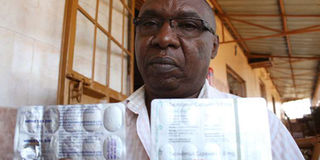Transplant patients seek post surgery support

Jeff Magiri, a kidney transplant survivor during an interview on September 29, 2015. The father of two was diagnosed with chronic kidney failure in 2012 and had a transplant in India in October, 2014. FILE PHOTO | PHOEBE OKALL | NATION MEDIA GROUP
What you need to know:
- If one fails to take the medication, the immune system can attack the transplanted organ, resulting in organ failure, which is fatal.
- The 54-year-old said he sometimes picks the medication from Kenyatta National Hospital for about Sh16,000 but “not always because they sometimes run out.”
The National Health Insurance Fund last month doubled benefits on services such as chemotherapy for its contributor.
The package included an increased cover for kidney transplants from Sh200,000 to Sh500,000, a relief it seemed, to cash-strapped Kenyans seeking better health services.
However, for Mr Jeff Magiri, a kidney transplant patient, the new rate was “just part of a solution to a bigger problem.”
Kidney transplant patients, and by extension those who have undergone any organ transplant, require life-long medication, which stops their bodies from rejecting organs after a transplant.
These drugs, sometimes nearly 10 tablets taken daily, help to suppress the recipients immune response to prevent rejection of the transplanted organs and tissues such as bone marrow, heart, kidney or liver.
They also keep allergies and high blood pressure in check.
If one fails to take the medication, the immune system can attack the transplanted organ, resulting in organ failure, which is fatal.
Mr Magiri, an NHIF member said: “I spend slightly over Sh33,000 per month on the immuno-suppressive medication so that I do not get kidney failure, antibiotics and others. But NHIF only caters for the transplant.”
The father of two was diagnosed with chronic kidney failure in 2012 and had a transplant in India in October, 2014.
He added: “That is not all, we also require a monthly check up by a specialised doctor. Nephrologists are in Nairobi and not in county hospitals, but even these check ups are not covered by NHIF. Is the fund planning to look into this?
“No one talks about what happens after the transplant, but that too is where the issues are. Patients still require a lot of medication but this bit seems not be considered. Otherwise, the organs will fail,” he told Saturday Nation on phone.
AFTERCARE
The 54-year-old said he sometimes picks the medication from Kenyatta National Hospital for about Sh16,000 but “not always because they sometimes run out.”
NHIF senior Public Relations officer Gerald Kainga said the government has negotiated with multinational drugs companies, such as Norvatis, to provide highly subsidised drugs including those for chronic conditions.
These will be supplied through Kenya Medical Supplies Authority (Kemsa) and Mission for Essential Drugs and Supplies (Meds). However, it is not known when this will take place.
In addition, the review of the kidney operation has a component of aftercare services (medical care after surgery/transplant).
Mr Kainga in his email added: “Progressively, NHIF has introduced an outpatient cover and therefore most of the aftercare maintenance will be dealt with under the routine visits covered in the comprehensive out patient cover.”
NHIF in April, 2015, increased premium rates for members in various categories.





